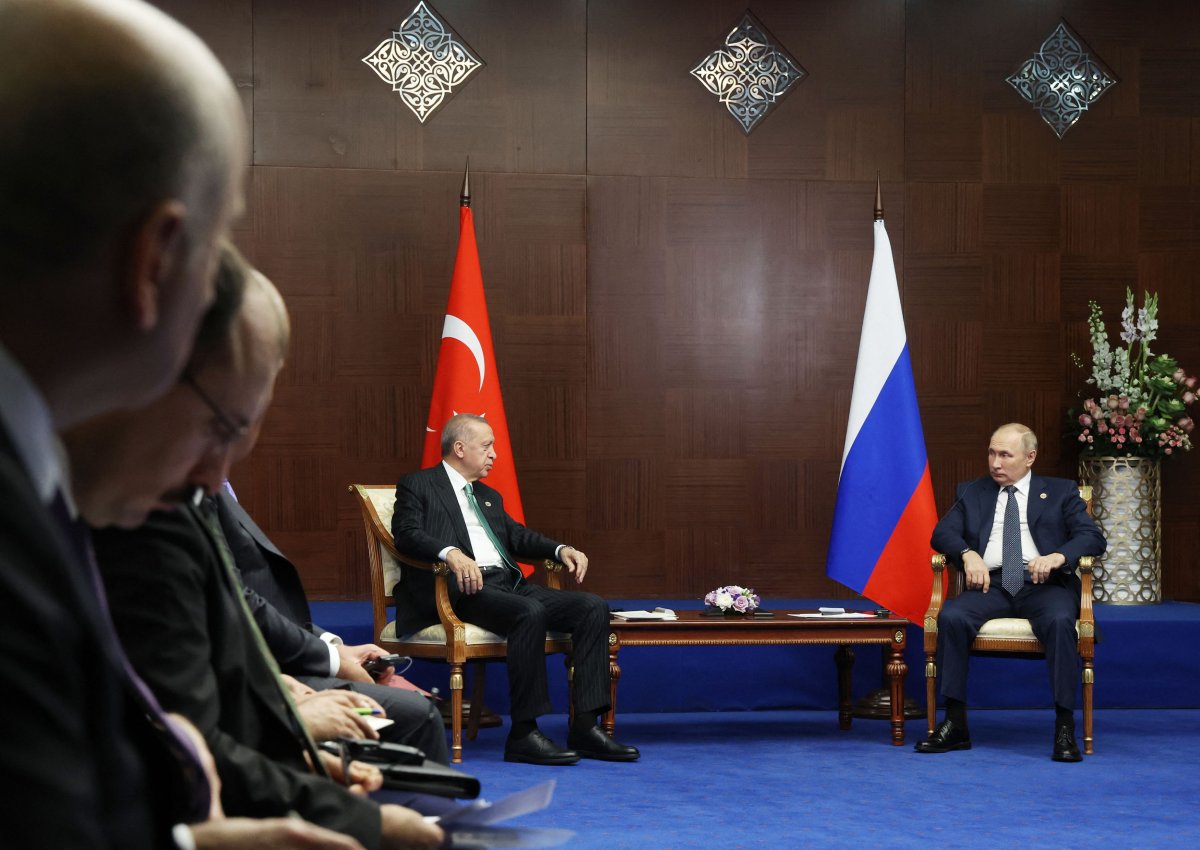Russian President Vladimir Putin plans to leave the country to meet with Turkish President Recep Tayyip Erdogan on an undisclosed date.
"The president of Turkey has confirmed his invitation to our president to visit Turkey," Putin aide Yuri Ushakov told Russian Interfax. "There are plans, but specific terms have not been discussed yet."
Erdogan has played an important role in the Ukraine war, often serving as a mediator between Kyiv and Moscow. His relationship with Putin is complicated: he treads a fine line between supporting Ukraine while also maintaining close diplomatic and economic relations with Russia.
The pair were last together in person in July 2022 in Tehran, Iran, joined by Iranian President Ebrahim Raisi, for discussions about a potential alliance as a result of galvanization in the West following the Russian invasion of Ukraine on February 24, 2022.
That was Putin's second trip outside the country since the start of the war. His first, in June of last year, was to Tajikistan and Turkmenistan to meet with Raisi, Turkmen President Serdar Berdimuhamedov, Azerbaijani President Ilham Aliyev and Kazakh President Kassym-Jomart Tokayev for the sixth iteration of the Caspian Summit.

Putin's last time leaving Russia before the invasion of Ukraine was to Beijing to meet with Chinese President Xi Jinping during the 2022 Winter Olympics.
On March 17, 2023, the International Criminal Court (ICC) issued an arrest warrant for Putin, accusing him and Russia's presidential commissioner for children's rights, Maria Lvova-Belovaof, of war crimes over the illegal deportation of Ukrainian children.
All ICC states—including every member of the European Union, most African states, all Latin and South American states except Cuba and Nicaragua, and even Tajikistan—are legally required to arrest Putin if he steps foot on their territory. However, Turkey does not recognize the ICC because it is not a party to the Rome Statute that established the court in 2002.
Erdogan's narrow reelection victory in May over Kemal Kilicdaroglu, the head of the center-left Republican People's Party (CHP), secured his third five-year term.
Mikhail Alexseev, a political science professor at San Diego State University, told Newsweek via email that Putin's meeting with Erdogan is likely to congratulate the president on his election victory—as well as make public two broader objectives.
The first objective, Alexseev said, is to demonstrate that Russia is not isolated internationally and to discredit the ICC ruling designating him as a war criminal subject. The second is to sow doubt about NATO's unity in long-term support for Ukraine.
"Those two objectives, from the Kremlin's standpoint, would be achieved regardless of what specific issues are discussed at the meeting, if it happens," he said. "Most likely, Putin would also wield inducements and threats related to gas exports, nuclear energy, the grain deal, immigration and security collaboration (on Syria and the Kurdish issue) to persuade Erdogan to minimize or end military assistance to Ukraine and also to continue blocking Sweden's entry into NATO."
The latest victory for Erdogan, 69, is viewed as a net positive for Putin. The Russian president has been unabashedly critical of NATO, of which Turkey is a member, for its defense of Ukraine—as well as providing weaponry and doling out sanctions against the Russian Federation.
Erdogan, following calls with Putin and Ukrainian President Volodymyr Zelensky, has reportedly proposed establishing an international commission to investigate the explosion at Ukraine's Kakhovka dam, according to the news organization Middle East Eye. The commission would include Turkey and United Nations members, among others.
NEW: Erdogan proposes to establish an international commission to investigate the explosion at Ukraine’s Kakhovka dam in phone calls with Putin and Zelensky
— Ragıp Soylu (@ragipsoylu) June 7, 2023
• Erdogan says the commission should include Turkey and UN among others
While perhaps not as trusted a confidant as someone like Belarusian Alexander Lukashenko, who has opened his country's borders to Russian military equipment, Erdogan is viewed as a mediator between Putin and Zelensky. The Turkish president supports Ukraine's sovereignty but doesn't feign from his own country's interests.
Putin and Erdogan have a shared interest in economic prosperity, which includes being trading partners. Turkey's role in NATO is not expected to prevent Moscow from continuing to extend billions of dollars worth of credit and gas payment deferrals to Ankara, and it could potentially provide Putin with a way to maneuver around sanctions.
The two presidents don't agree on everything, however, as they support opposing sides in Syria.
Update 6/16/23, 10:12 a.m. ET: This article was updated with comments from Mikhail Alexseev.
Uncommon Knowledge
Newsweek is committed to challenging conventional wisdom and finding connections in the search for common ground.
Newsweek is committed to challenging conventional wisdom and finding connections in the search for common ground.
About the writer
Nick Mordowanec is a Newsweek reporter based in Michigan. His focus is reporting on Ukraine and Russia, along with social ... Read more
To read how Newsweek uses AI as a newsroom tool, Click here.






